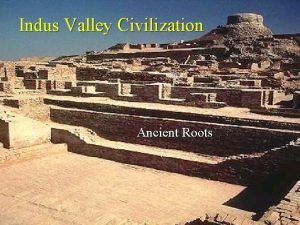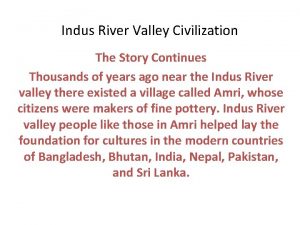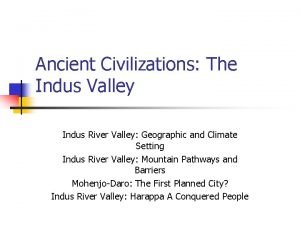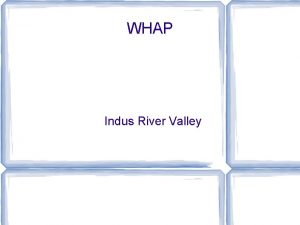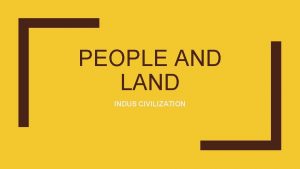The Aryans in Indus Valley Aryans translates as




- Slides: 4

The Aryans in Indus Valley Aryans (translates as “nobles”) were also an Indo. European people who crossed over the Kush mtns into Indus Valley c. 1500 B. C. Left very little archaeologically – but we have their sacred texts – Vedas (sacred literature of the Aryans, containing prayers, spells and rituals. The Rig Veda is the most important The Vedas tell us about the daily life of the Aryans They were passed on orally but written versions date c. 500 B. C.

Aryans in the Indus Valley Aryans (“nobles”) called the people they found in Indus Valley Dasas (“darks”) because of their skin tone Dasa eventually meant slave Aryans were taller, lighter in skin tone and spoke a different language than the Indus Valley people , they also did not have a written language and were pastoral nomads

Caste System Develops Aryans had 3 set social classes before coming to Indus Valley (4 distinct social classes of the Ancient Aryans which carried through to modern India) - Brahmins (priests) -Warriors -Peasants/Traders When they came to Indus Valley they added a 4 th class Shudras (non-Aryans) A persons social class determined their role in society The Aryans wanted to limit their interactions with the non-Aryans so the class restrictions became very strict

Caste Systems cont. Shudras ( the Indus natives) =less desirable jobs Because the shudras were darker skinned – skin color =distinguishing feature of class People were born into their caste for life- they could not change classes, it determined their jobs, their marriages, and who they could associate with Cleanliness and purity became all-important “Untouchables” – those considered so impure that even touching them would make others unclean (butchers, gravediggers, trash collectors)
